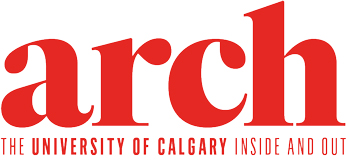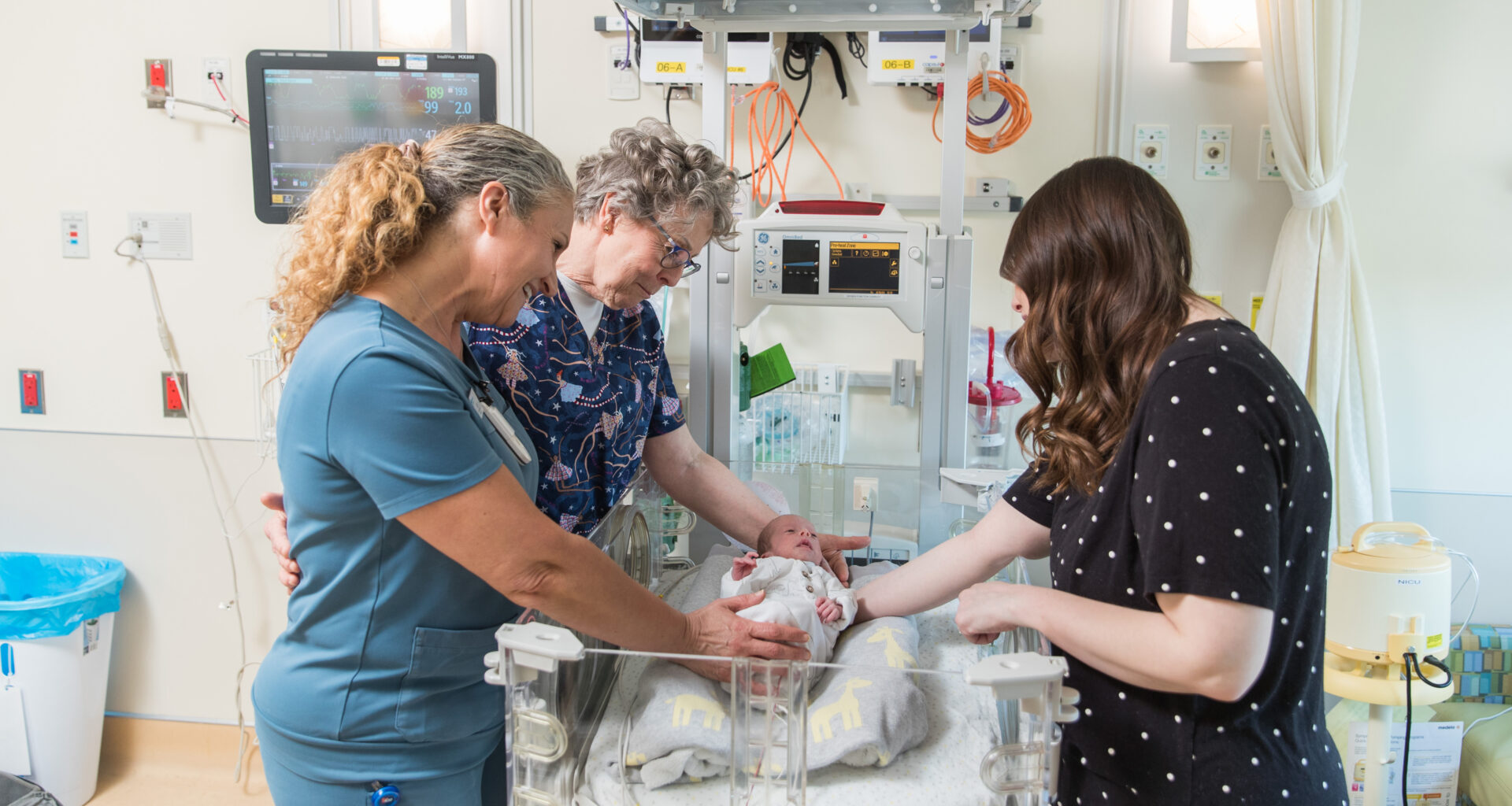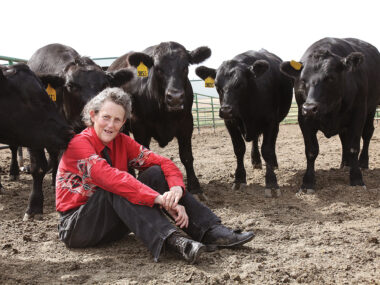Written by Jacquie Moore, BA’97
Photography by Adrian Shellard, BA’98
Early in the morning of March 15, 2024, seven weeks before her estimated due date, Dani Gathercole gave birth to a three-pound, one-ounce baby girl at the Foothills Medical Centre. The new mom held her tiny daughter for a moment before she had to let her go to be assessed by the neonatal medical team, including a respiratory therapist, nurse and physician.
In addition to her low birthweight and other potential challenges associated with preterm birth, baby Kenly had a blockage in her gastrointestinal tract, discovered during an ultrasound, and was transferred to the neonatal intensive care unit (NICU) at the Alberta Children’s Hospital (ACH).
Every year, nearly 400,000 babies are born in Canada. More than 30,000 of those babies come into the world prematurely — that is, at less than 37 weeks of gestation. Babies born too early, especially before 32 weeks, are at risk of serious health complications, including breathing and feeding problems. In 2021, in Alberta alone, about 4,400 preterm babies spent between two and 100 days or more in a NICU with some requiring follow up emergency department visits or even hospital re-admission.
The emotional impact on parents associated with a preterm baby can be intense and highly distressing. A sudden introduction to the highly technological critical-care environment of a NICU only adds to the overwhelm for parents during an already stressful time.
When she first saw Kenly in the NICU surrounded by cords and wires, Gathercole says she was overwhelmed, but was encouraged to reach in and touch her baby.
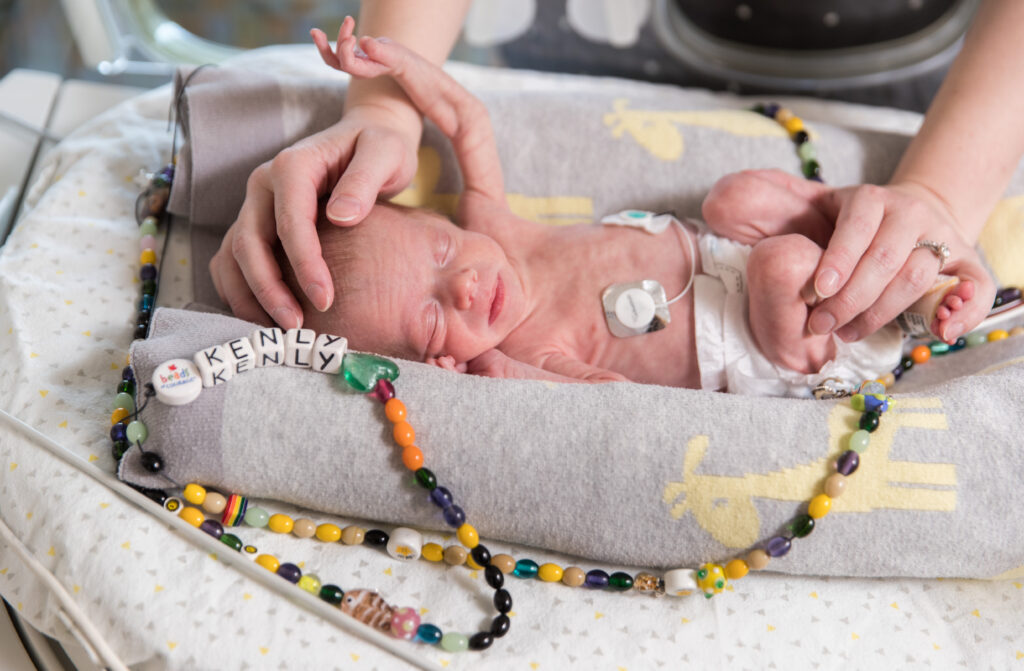
In addition to negative social and financial impacts on families, preterm births come with tremendous cost to health care. While reducing incidence of preterm birth is a significant research priority at the University of Calgary and around the world so, too, is accelerating a healthy journey home for the youngest patients. A newly implemented Alberta Health Services gold-standard model of care called Alberta FICare (Alberta Family Integrated Care) is making that happen.
While Alberta has always had excellent NICU-care managed and executed by world-class experts with access to the best equipment, research increasingly points to the importance of an aspect of preterm-baby care that transcends medical expertise and cutting-edge technology: greater family involvement. By empowering parents, grandparents and other caregivers with increased knowledge, skills, and confidence to care for a newborn in the NICU and at home, Alberta FICare is positively transforming outcomes for preterm babies.
Implemented in all 14 NICUs across the province in 2022, FICare consists of a constellation of practical, easy-to-use tools including educational videos, a journal that details how parents can participate in bedside rounds, and other coaching resources and hands-on training for NICU parents. Since it began, emergency department visits have dropped 26 per cent, and hospital readmissions are down 37 per cent for former NICU babies in the first week after leaving hospital. As well, the FICare model shows a 2.55-day reduction in the length of hospital stay for moderate- and late-preterm infants; mothers report a decrease in feelings of distress; and parents report increased confidence in caring for their infant.
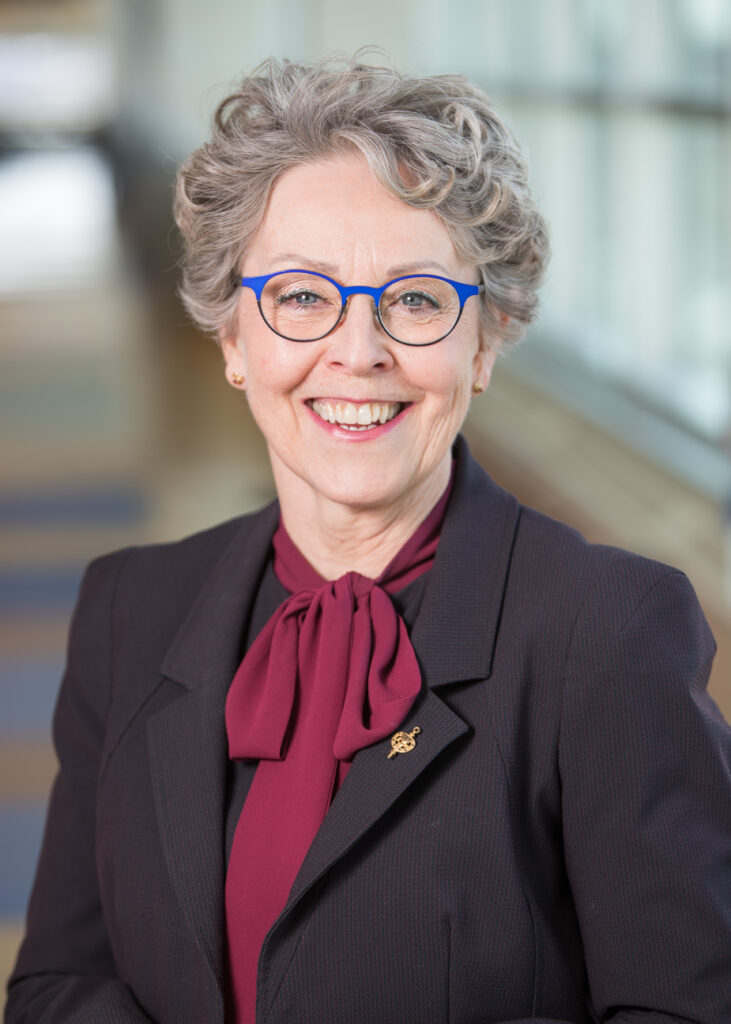
The intensive research and trials that underpin Alberta FICare were led by Dr. Karen Benzies, PhD, a professor in UCalgary’s Faculty of Nursing and adjunct research professor with the departments of Paediatrics and Community Health Sciences in the Cumming School of Medicine. Inspired nearly a decade ago by models of care in NICUs around the world, including at medical centres in Finland, Spain and Toronto’s Mount Sinai Hospital, Benzies began an investigation of what a more-effective version of traditional family-integrated care could look like in Alberta NICUs. She began by interviewing parents, clinicians, nurses, therapists, social workers and other health-care providers about what they need to do their best for critically ill babies and their families.
“Health-care providers in NICU know what to do to save babies’ lives and they know to do it fast,” says Benzies. “But something was missing. It was time for a culture shift that operates out of strong research that shows infants grow faster and have less stress when their family is a big part of their lives, right from the moment of admission to the NICU.”
Benzies and her team built on decades of science that back that up — it’s long been proven that keeping newborn babies physically close to their family has enormous benefit. “Research shows us that, for a critically ill newborn, routinely receiving hands-on care from their family is good for their brain development, beneficial to their microbiome health and key to thermoregulation,” she says. “Skin-to-skin contact decreases stress, helps reduce a baby’s heart rate and improves their temperature regulation.”
Indeed, “kangaroo care” — that is, holding a NICU baby against the parent’s chest — has been practised worldwide since the idea spread out of research done in Bogota, Columbia in the 1970s. Studies, then and now, show that such parental contact has enormous health benefits, including high blood-oxygen levels, better sleep and more weight gain in preterm babies. As well, infants placed skin-to-skin earlier achieve feeding success more quickly and gain weight faster.
In many parts of the world, family-centred care has been the philosophy underpinning neonatal and pediatric health care for decades.
“Involving the family in their premature baby’s care has evolved internationally over time,” says Benzies. But, she adds, “it took many years to move from simply engaging the parents in conversation and allowing them to be present in the NICU, to this new model that encourages them to participate in their baby’s care alongside their NICU health-care team.”
With Alberta FICare, NICU health-care providers receive training in how to interact and communicate with families coping with a highly stressful situation. Health-care providers work with parents like Dani and Austin Gathercole on a day-to-day basis to coach them as they become more engaged with their child’s care.
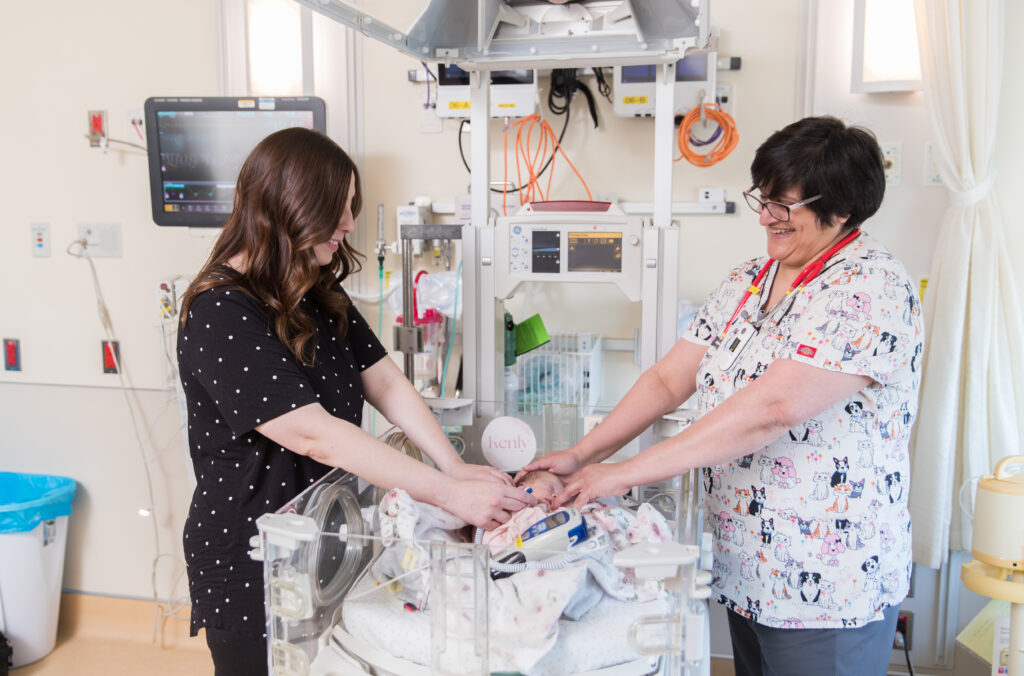
For baby Kenly’s parents, Alberta FICare practices provided an almost-instant source of purpose that brought relief to their anxious situation. By noon on the same day Kenly was born, Dani was taking her temperature and changing her diaper.
“Austin and I immediately felt useful and wanted by the NICU staff,” says Dani. “We feel heard and respected by the medical team, and they include us in conversations and decisions about Kenly.” Rather than dictating the schedule themselves, nurses at the NICU wait for Dani to arrive from nearby Ronald McDonald House each morning to bring freshly pumped milk and to breast feed Kenly.
FICare parents are invited to be in the NICU up to 24 hours a day with their baby, change diapers, feed them, have skin-to-skin contact and participate in bedside rounds with the medical team. This helps families like the Gathercoles develop a bond with their child, while also learning how to communicate about their baby’s care. Bedside rounds can include conversations about a baby’s progress, tests that need to be ordered, medicines that they’re taking and how a care plan is evolving. Dani uses the provided Alberta FICare journal to chart changes in her baby’s appearance or behaviours to share with the health-care team.
“The family-integrated model of care supports a culture shift where parents become true partners in their sick newborn’s care in the neonatal intensive care unit,” says Benzies.
It’s a tremendous win for babies, for their families and for the health-care system. Benzies estimates the reductions in NICU length-of-stay have saved the health system about $1.2 million over a two-year period. And the impact is growing dramatically. Her team project that, by December 2025, Alberta FICare will have freed-up a grand total of between $9 and $11.25 million in NICU capacity province-wide.
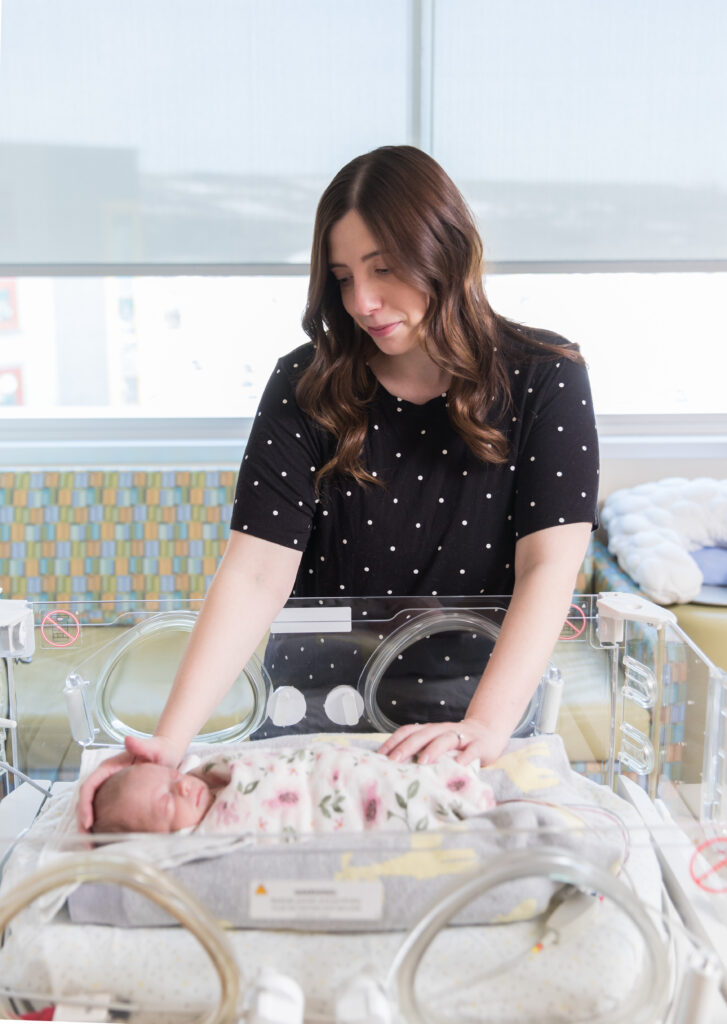
Benzies and her team of colleagues and graduate students are working with health-care providers in other provinces to expand the Alberta FICare model of care to ensure families across the country will have access to coaching, skills and encouragement to nurture their new baby every step of the way.
Dani and Austin, whose home is in Red Deer, aren’t sure when baby Kenly will be discharged from the NICU.
“That’s the million-dollar question,” says Dani, who adds she doesn’t spend much energy worrying about that now. She’s more focused on watching Kenly gaining weight and is content to just be near her baby all day, every day, while she grows.
“I get to cuddle her whenever I want.”
At UCalgary, we’re taking the lead in transforming child health. Join us May 8 for our second event in the Creating Tomorrow series where we will explore the relationships, partnerships and people involved in improving child health and wellness in Canada. Register now.
